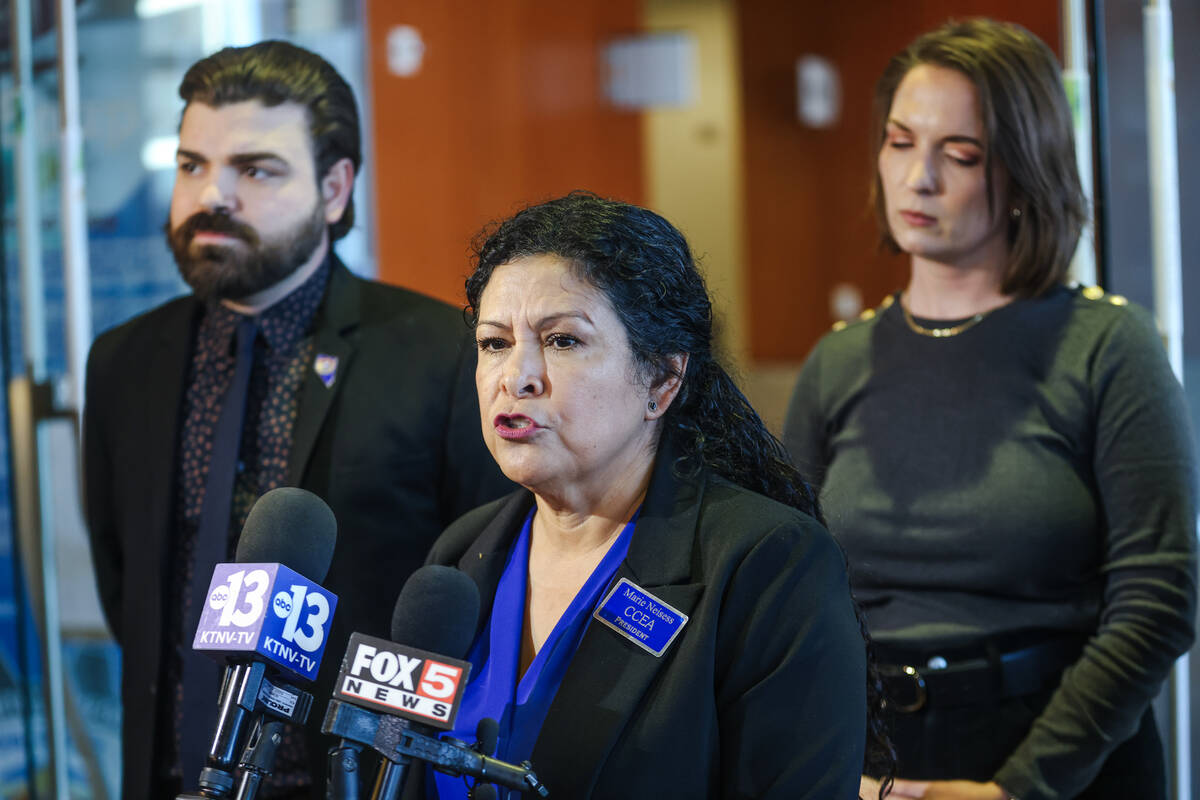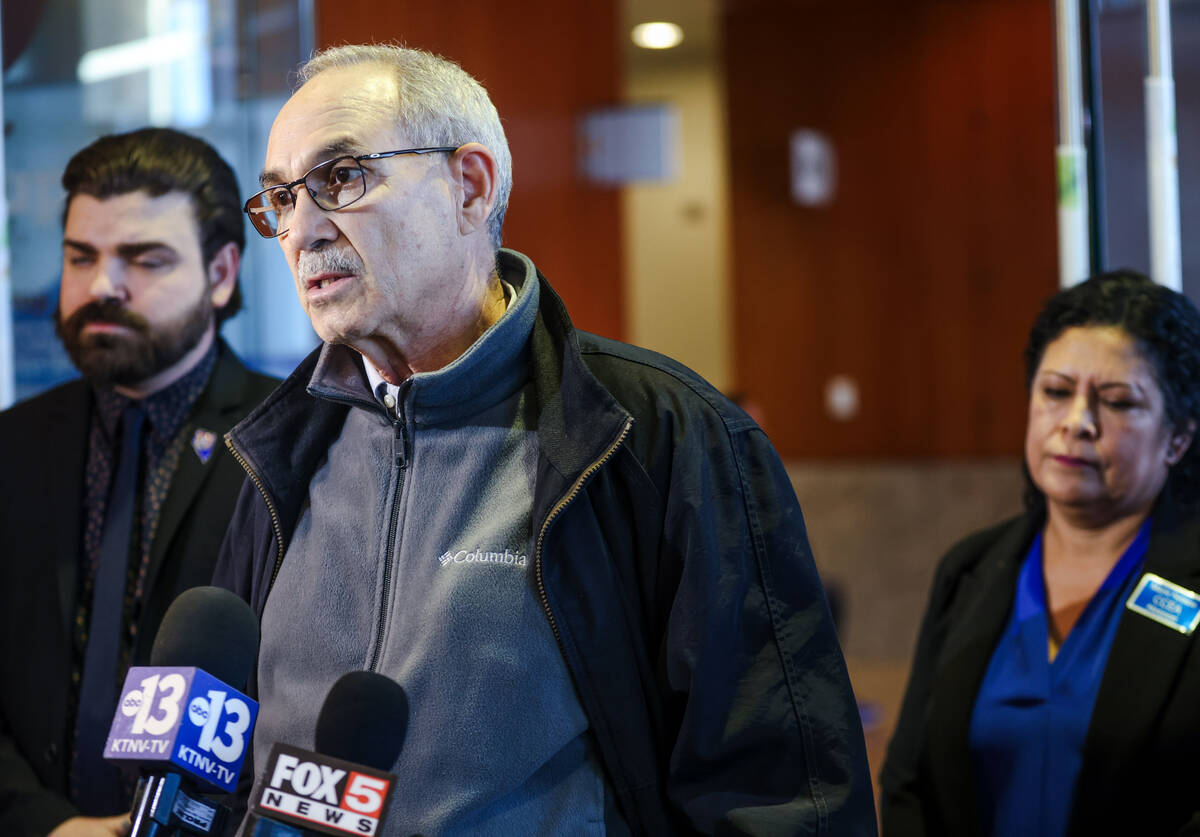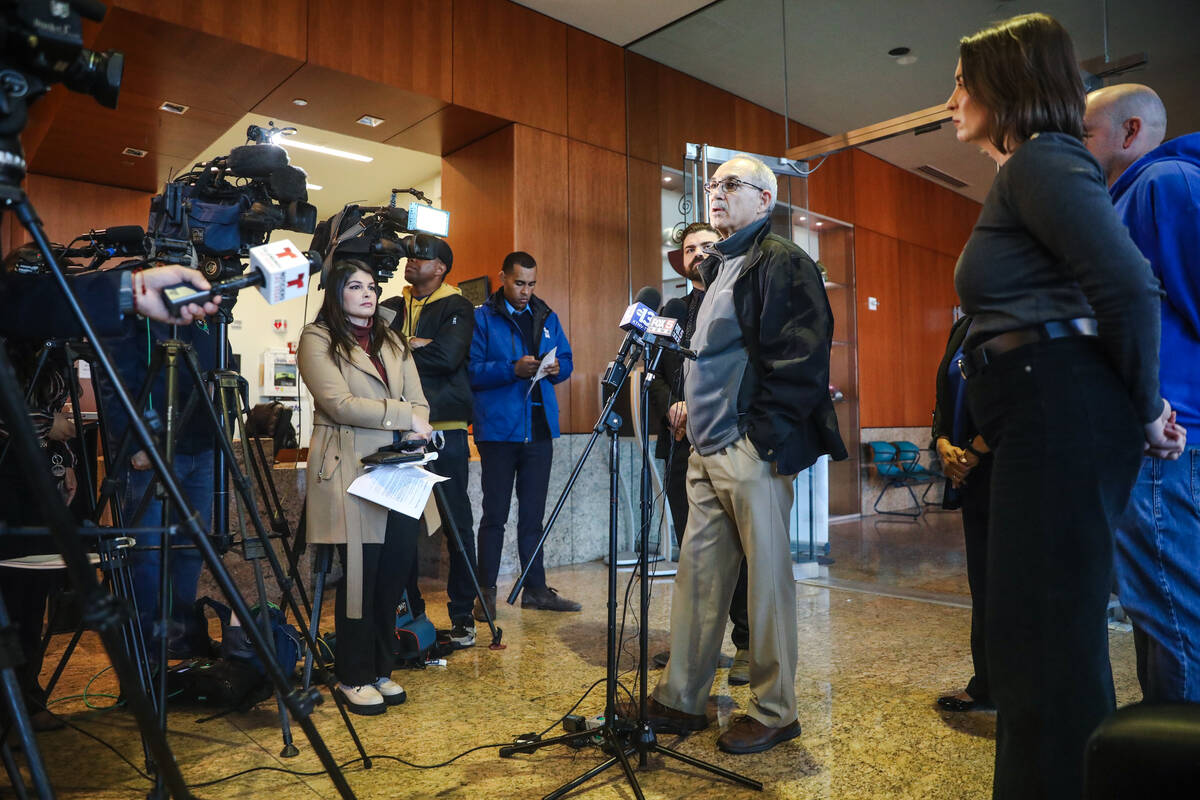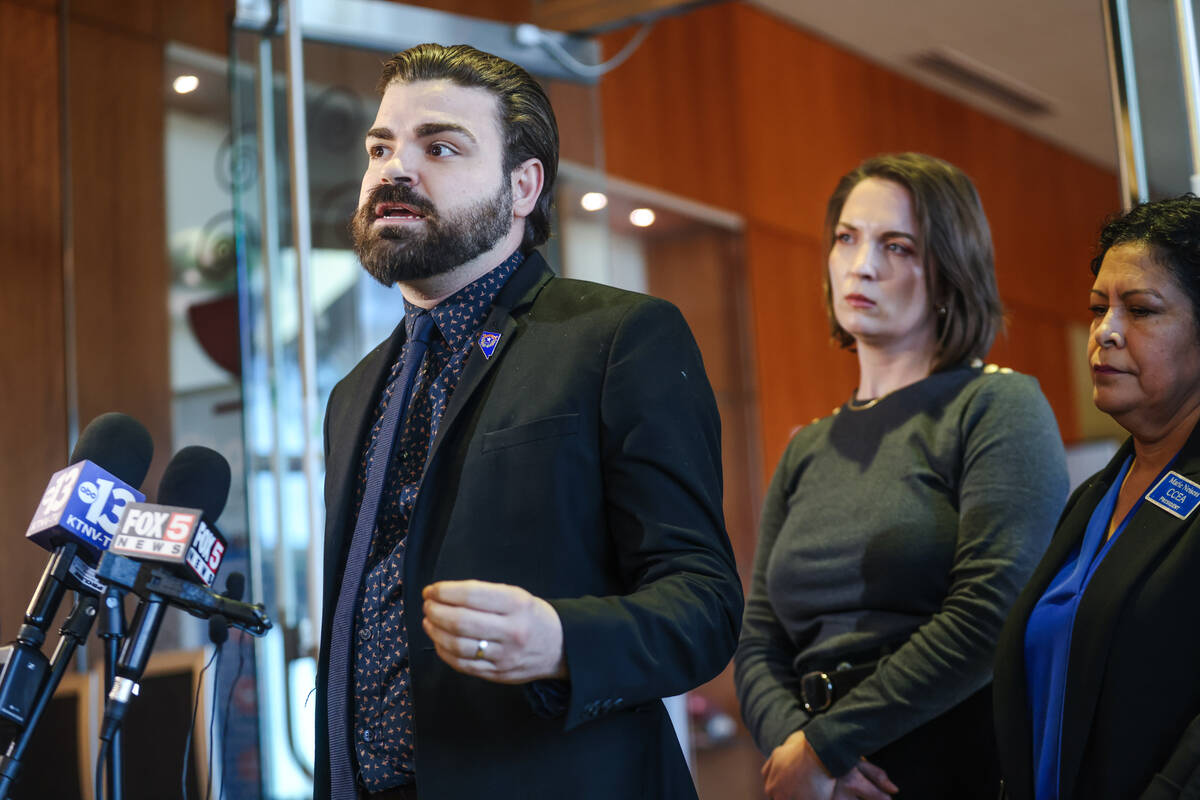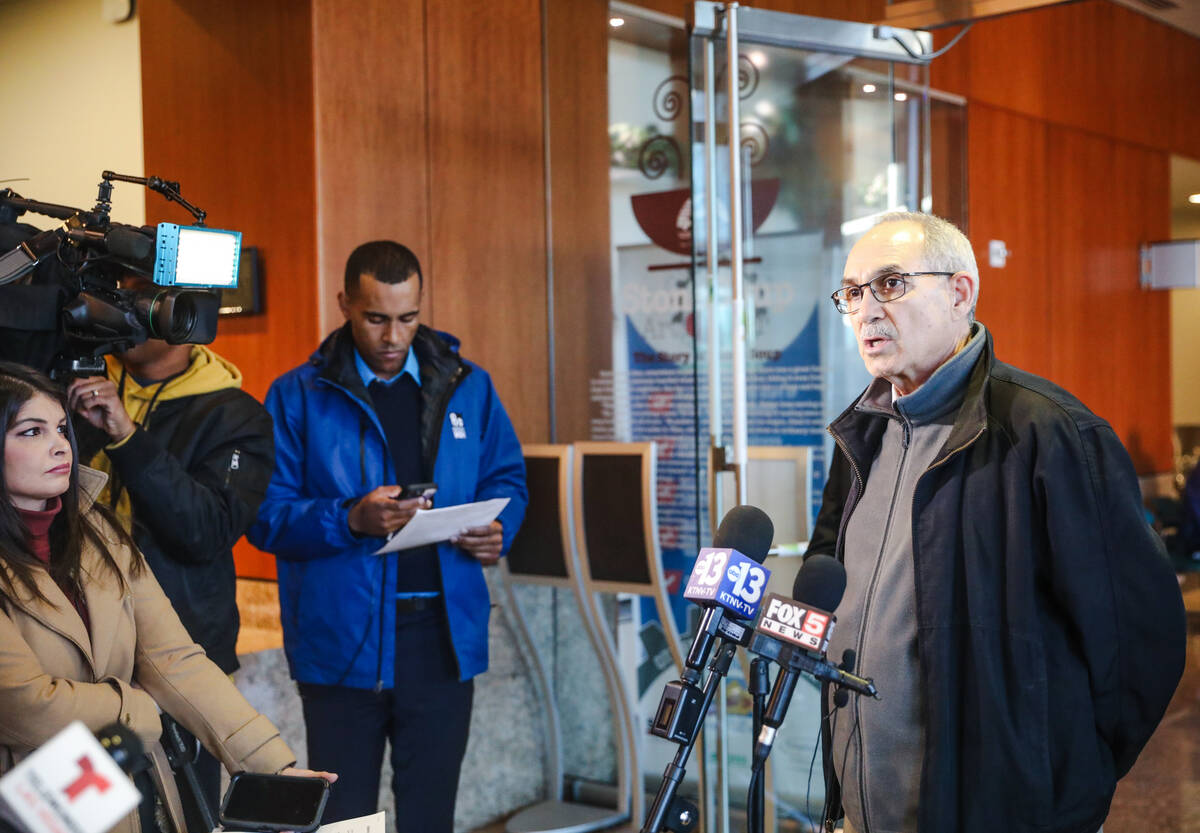Teachers can’t strike in Nevada. Union wants voters to change that
The Clark County Education Association wants Nevada voters to decide whether educators have a right to strike.
The teachers union — which represents more than 16,000 licensed employees — announced Wednesday night that it’s launching an effort to gather 102,362 signatures in order to put the proposal on a ballot for a 2026 election.
A union-backed political action committee called “A Teacher in Every Classroom” filed an initiative petition with the secretary of state’s office just minutes before a Thursday press conference at North Las Vegas City Hall.
In a video message released Thursday, CCEA President Marie Neisess said the union wants to ensure that every educator’s voice is heard.
“We are handcuffed by a law that was passed in 1969 and our educators want the ability to strike and so this is just the next natural step,” she said.
The union’s move follows a contentious collective bargaining process last year between the union and the Clark County School District.
Currently, it’s illegal for public employees in Nevada — including teachers — to strike.
Neisess said it’s her 31st year in the district and that teachers have continually had to fight for every penny they deserve.
The petition says the aim is to amend state law to say that prohibitions on public employee strikes don’t apply to “local government employees licensed as teachers” and their “employee organizations, bargaining agents, and bargaining units.”
A description of the effect says that the initiative, if enacted, would “exempt licensed public school teachers and certain other licensed educational personnel from the current strike prohibition, so that they would have the right and ability to strike if they so choose.”
There’s a 14-day window for any legal opposition after the measure is filed, CCEA Executive Director John Vellardita said during the press conference, adding he believes it will stand the test of legal scrutiny.
He said the process of gathering signatures could begin in as soon as four weeks.
Over the last 10 years, teacher contract negotiations have ended up in arbitration four times, said Jordan Wenger, a school psychologist and a member of CCEA’s executive board.
She said the binding arbitration system from the 1960s is no longer working for educators or students in Nevada and the union is hoping for a speedier process in the future.
Wenger also said the union is open to conversation during the 2025 state legislative session about changing the state law.
If that doesn’t pan out, she said, they’ll take the proposal to voters.
Union officials met with 49 state legislators on Wednesday night and had a conversation about the proposal, Neisess said.
If the state law is changed to allow for teacher strikes, she said the union would make sure to provide ample notice to parents before a strike occured.
Vellardita said the union would sit down with the school district to identify essential services for students, such as meals, and wouldn’t want to disrupt that.
Tam Lester, a teacher at Del Sol Academy of the Performing Arts and a CCEA executive board member, said: “This is frankly about the community.”
The community suffers without teachers in classrooms, he said.
Lester said the union would use the right to strike responsibly.
In response to a question from a reporter, Vellardita said he has not talked with school district Superintendent Jesus Jara about the initiative petition and thinks Jara’s going to read about it in the press.
In a Thursday statement, Jara wrote: “CCEA missed an opportunity to equitably compensate our veteran teachers with the lookback we proposed. For the sake of the community, CCEA’s time, energy, and member dues can best be deployed on behalf of our educators, who show up daily for students.”
“The law they seek to overturn exists to prevent community chaos and its adverse impacts on our economies and families,” Jara wrote. “We need more transparency, not chaos, in public sector negotiations. Transparent public sector negotiations would benefit our teachers, students, and taxpayers rather than attempts to sow more discord.”
Gov. Joe Lombardo’s office declined to comment Thursday.
Number of required signatures
Signatures must be evenly distributed across the state’s four petition districts, with at least 25,591 from each one, the union wrote in a news release.
The signatures are due to the county’s registrar of voters by Nov. 20, according to the union, which claims preliminary polling shows about 70 percent support for teachers’ right to strike.
“However, we are not walking away from other critical avenues for change,” said the union.
The Clark County Education Association said it is challenging existing legislation in court, an effort it’s willing to take to the Nevada Supreme Court under First Amendment claims.
“We are also engaging with state legislators to seek other legislative solutions to address the systemic obstacles currently presented by the existing binding arbitration laws,” the union said. “Should our efforts in the courts and legislature not yield the desired results, we are confident that the voters of Nevada will stand with our educators.”
Contract negotiations
Contract negotiations between the union and school district began in late March 2023. Union members held protests over the summer, including in front of school campuses and at school board meetings.
After 11 bargaining sessions, the school district declared an impasse in September. Last month, an arbitrator approved an agreement.
In September, a District Court judge ruled that a teacher strike had occurred and ordered a preliminary injunction after unexpected staffing shortages closed eight schools for one day each. The union has denied any involvement.
The union filed an appeal with the Nevada Supreme Court. Justices denied the union’s request for an emergency motion for stay. The case remains pending.
In October, the union filed a lawsuit in District Court against the school district and state of Nevada seeking to overturn the state’s longtime ban on public employee strikes.
The union argued that five provisions under the state law are unconstitutional.
The penalties are steep for violating the law, including fines of up to $50,000 each day for a union and up to $1,000 each day for union officers.
The union filed a notice last month to voluntarily dismiss the case, according to online court records.
‘Prolonged and unnecessary arbitration’
The union said in a Wednesday news release that the ballot initiative comes after educators have faced “prolonged and unnecessary arbitration” during the last four contract negotiations.
Teachers didn’t have a contract for half of this school year, the union said, adding the process exacerbated the teacher shortage and negatively impacted student learning.
In the Thursday video message, Neisess said that the ability to strike has clearly worked in other places, pointing to Oregon and Los Angeles. But she said only 13 states allow teacher strikes and that’s unacceptable.
Neisess said she knows the anxiety is there for families, but there’s community support for allowing teacher strikes.
Vellardita said in the video that state law allows for a process called binding arbitration but also stated that it doesn’t work and favors the employer.
Contact Julie Wootton-Greener at jgreener@reviewjournal.com. Follow @julieswootton on X. Contact Ricardo Torres-Cortez at rtorres@reviewjournal.com.



